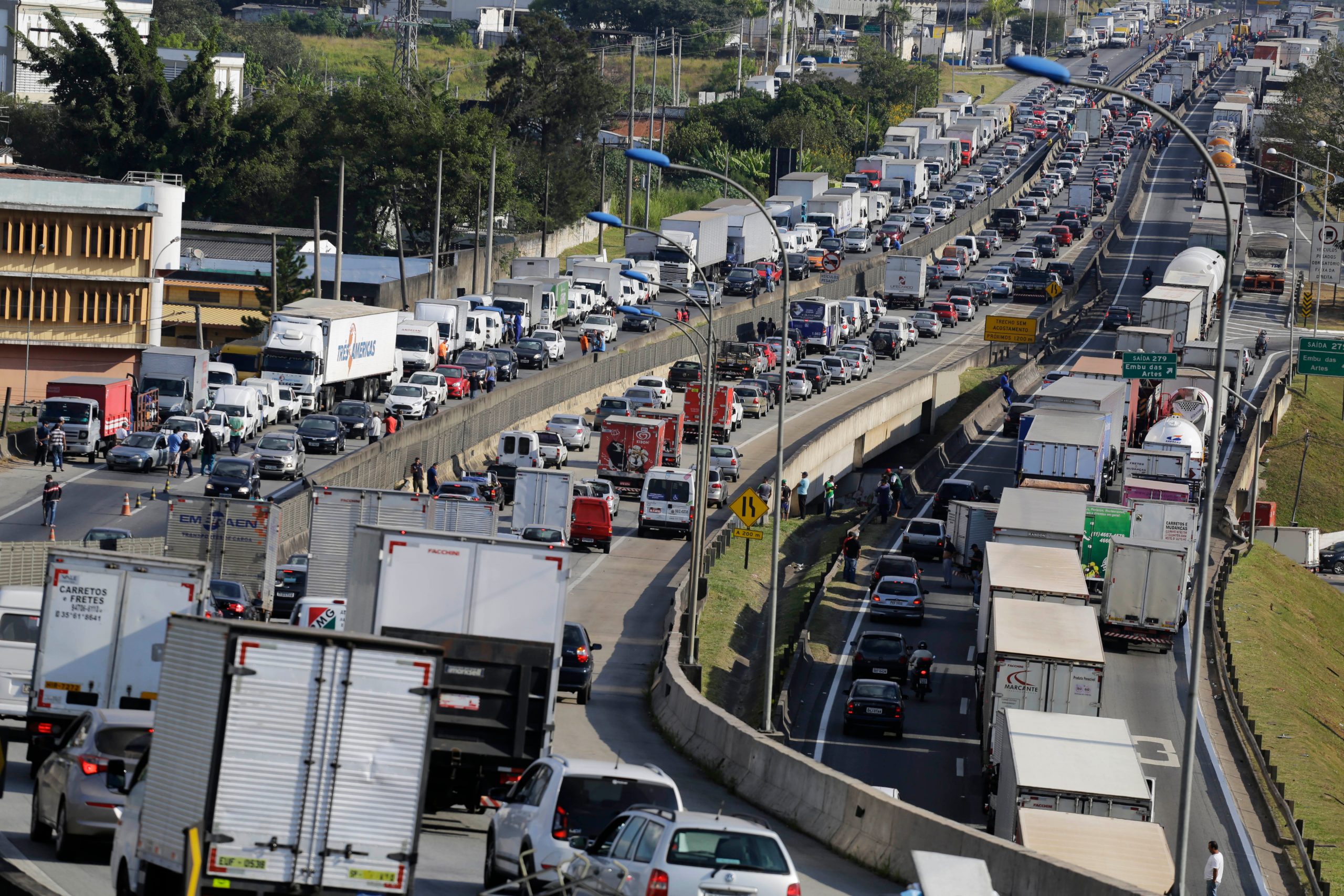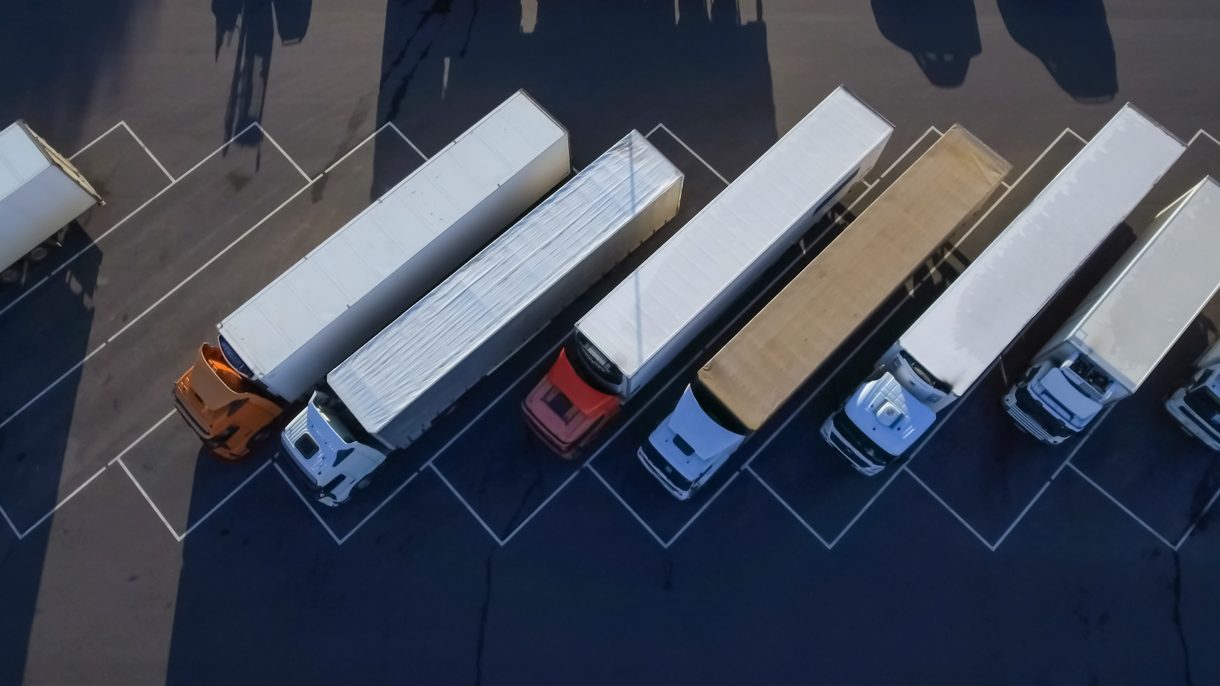
How to Stay Healthy on the Road
July 26, 2021
Tips for Reducing Stress While on the Road
August 19, 2021Want to know how to stay safe at a truck stop?
For truckers, the sight of a truck stop can give a feeling of relief. Truck stops provide an opportunity to refuel, take a shower, get some rest, enjoy a nutritious meal, stretch their legs or even exercise.
Truck stops, however, can be dangerous for truckers, from the potential for damage to your truck to the risk of crime.
Many of the problems truckers face at truck stops stem from a lack of parking. 98% of truckers report having difficulty with finding a parking spot at truck stops. This truck parking shortage can create dangers for truckers as well as their trucks.
We have you covered with a comprehensive guide to help you stay safe at truck stops. Read on to learn truck stop safety tricks and tips to decrease your chances of sustaining damage to your truck or of injuring yourself.
Reasons for Truck Damage at Truck Stops
Your truck can sustain damage anywhere, but truck stops, where the traffic volume is high and drivers are in a hurry, can be hot spots for collisions.
Semi-trucks are huge, so it is hard to believe that other drivers would not see them, but it does happen. So why are truck stops so prone to semi-truck collisions?
There are several reasons why your truck might get damaged at a truck stop.
- Truck stops are popular training grounds for new drivers. CDL trainers like to take students there to help them learn how to drive a rig. While this is great for students, it can lead to damage to your truck. These inexperienced drivers could run into you and damage your truck.
- The parking spots at truck stops may not accommodate your truck. Most trucks are longer than the parking spots. Trucks have increased in length over the past few decades, and many truck stops have not updated their parking spots to accommodate the new truck size. The tight quarters increase the potential for accidents.
- Experienced truckers can even damage your truck. They may be distracted, drowsy, rushing to get back on the road, or even intoxicated. Sadly, hit-and-runs among truck drivers are not uncommon.
Your insurance can help minimize your financial liability in the event that your truck takes damage at a truck stop, but you may still suffer financial losses. You may have to pay an insurance deductible, and the downtime, while you wait for your truck to be repaired, can hurt your bottom line.
Your best option is to do everything within your power to decrease the chances of getting into an accident. Accidents are always a risk, but read on for truck stop tips to help you minimize the risk.
Truck Safety Tips for Safe Parking
You want to protect your truck to limit your own financial responsibility as an owner-operator or protect your reputation with your carrier if you drive for one. With a few small changes, you can decrease your risk of damage to your truck. After all, your truck is your livelihood, and you want to protect it. These tips can help!
- Park away from high-traffic areas. Quickly assess the parking lot and where you see the lowest volume of truck traffic. This may be at the very end of the parking lot, farthest from the fuel island. However, in some parking lots, the ends of the rows are the most dangerous spots. Just be observant and mindful that your choice of parking spot can help reduce the chances that you get in an accident.
- Use good parking practices, and only park in designated spots. Rather than pulling in and backing out, back your truck into the spot, so that you can easily spot other trucks when you are backing out. It will be easier to spot other trucks that could collide with you and can decrease your chances of hitting a pedestrian.
- Only use fuel islands for fueling, not 30-minute breaks. It irritates other drivers, and it is truly in your best interest to avoid spending time in high-traffic areas like fuel islands where collisions are more likely to occur.
- Be attentive to the traffic patterns and drive slow. Driving too fast or ignoring the established flow of parking lot traffic makes it more likely that you will get in an accident.
- Inspect your vehicle before you leave every time. Hit-and-runs happen at truck stops. You may not even realize your truck has been damaged until much later. For your safety, you want to identify any problems before you return to the road. It will be easier to address any damage at the truck stop, and you might wish to see if there’s any footage from the truck stop’s security cameras of the hit-and-run to help with insurance claims.
- Park your truck beside a curb when possible. This protects at least one side of your truck from other drivers that, for some reason, may not see your giant trailer. These spots may be located further away from the building than other spaces, but that just means it’s a quick and easy way to work some exercise into your day. After all, health risks from the sedentary nature of truck driving pose one of the biggest dangers to trucker safety.
- Pay attention to your needs. You may be pulling into the truck stop because you are tired, hungry, or feeling unwell. If you can avoid it, try not to let yourself get overly tired or hungry. This increases the chances that you will get in an accident.
- Carry a charged phone with you at all times. You never know when you may get in an accident and need to get in touch with your insurance company quickly. Additionally, if you need to call the police, you can do so immediately.
- Look for poles or other objects to park next to. The object will provide a barrier between you and the other trucks so that you can rest assured that at least one side of your truck is protected.
- Avoid truck stops that have smaller spots. This may not be possible in some situations, but as a rule, if you can avoid the truck stops with smaller spots, it is in your best interest. Additionally, the lost revenue puts economic pressure on these truck stops to update their parking spots.
- Try to stop driving earlier in the evening if you can. The later you wait to pull over, the less likely you are to find an adequate spot.
- Avoid parking next to drivers who have done a bad job parking or look like they are about to leave. Generally, you want to avoid being parked next to moving trucks. If you have the opportunity, park away from other drivers. Of course, you have to balance your truck’s safety against your own. Parking too far away from other truckers, especially in poorly lit areas, can make you a target for robberies and other crimes. If you know that a truck stop is particularly dangerous, you may wish to put your truck more at risk for the sake of your personal safety.
- Buy a dash-cam. As we have discussed, hit-and-runs happen at truck stops. A dash-cam will record whatever happens in front of your truck. This can help you hold the responsible party accountable, or at least, if you drive for a carrier, you have evidence that you did not cause the damage.
Tips for Personal Safety at Truck Stops
Truck stops do not just pose challenges for your truck. Your personal safety as well as the security of your cargo are at risk.
Although cargo theft can happen anywhere, the cities with the highest rates of cargo theft include Los Angeles, Atlanta, Chicago, Miami, Dallas, Houston, Memphis, and Southern California. It is best to proceed as though cargo theft is a possibility regardless of where you are stopping.
In addition to robberies, truck stops can be the sites of violent crimes like rapes, assaults, or even murders, and unfortunately, truckers can be victims of these crimes.
The first legislative push to increase the number of parking spots was called Jason’s Law, part of the Highway Restoration Bill in 2012.
Jason Rivenburg was hauling a load in 2009, and he parked at an abandoned gas station when he was ahead of schedule and unable to go to the delivery site early. There were no nearby rest stops or truck stops, so he parked where he could. He was murdered and robbed at the gas station.
He left behind a wife and three children. His widow worked tirelessly to help pass legislation that aims to fix the problem with the shortage of truck parking spots. Jason’s Law requires states to survey periodically how much parking is available to truckers, and the current pushes for more parking can be traced back to this law.
Until the shortage of truck parking spots is adequately addressed, keep these tips in mind to keep you and your cargo safe.
- Be mindful of hazards at the truck stop. Poorly lit areas or walkways that are not salted or have tripping hazards are unsafe. Avoid these areas whenever possible.
- Watch out for and avoid reckless drivers. At a truck stop, there are many reasons truckers may drive aggressively or not pay attention. From drowsy drivers to hangry drivers to hurried drivers, sometimes drivers speed or engage in other dangerous driving behaviors. They can damage your truck, leaving you stranded while you get it repaired. Unfortunately, some truckers commit hit-and-runs. A distracted driver can even injure you or worse.
- Be aware of your surroundings. Sadly, truck stops can even be sites for violent crimes, and sometimes truckers are victims of these crimes. While it is sometimes challenging for truckers to find a safe parking spot, try to prioritize it if you can. That way you can take advantage of the camaraderie that exists among truckers who often look out for one another.
- Keep your doors locked. You probably already do this, but keeping your doors locked at all times is crucial. Locking your doors while you are sleeping or away from your truck is important.
- Use your safety belt to add some extra security to your door. While you are sleeping, you can pull your seatbelt through the door’s armrest and click it into place. When combined with a locked door, this is an additional barrier that will at least slow down a criminal and give you more time to act. If you have no other option other than pulling over at a dangerous truck stop, consider using your seatbelt in this way.
- Get a padlock for your truck to protect your cargo. This protects your valuable cargo against robberies. While a padlock is not a guarantee that your cargo is safe, it can deter criminals.
- Buy pepper spray. Some truckers choose to carry a weapon with them. Be sure to know the laws regarding weapons in whatever state you drive through, and be sure to put the weapon in a safe location where it is accessible but secure. If you choose to carry a deadly weapon in your cab, be aware that you run the risk of your attacker taking possession of the weapon, which could escalate a non-violent crime to a violent one. Some truckers may not be comfortable with this risk. Pepper spray can be a good choice because it can stop an attack but is not deadly.
- Do not discuss your freight with others. If people know you are carrying high-value items, they might target you.
- Pull down blinds or hide valuables. Thieves are looking for easy targets. Just like with driving a car, leaving out electronic devices or other expensive items will draw in criminals.
- Read reviews of truck stops along your routes in advance. Sometimes truckers will let you know whether parking is a problem or if a particular stop has become a hotbed for crime. Stopping at a less than ideal truck stop may be unavoidable at times, but this is a good general rule to abide by.
- Take note of areas with high crime rates along your routes. You can learn this by doing some online research or speaking with other truckers who travel the same routes. You may not always be able to avoid high-crime areas, but at least you can be more prepared when you are forced to stop in one. Keep in mind that crimes can happen even in the safest areas, so it may be best to always take the precautions we discussed in this guide.
Semi-Truck Parking Shortage
Freight transportation is expected to grow significantly over the next few decades, so the problem could get even worse. Fortunately, there is growing public awareness concerning this problem.
The shortage of truck parking spots is on the radar of state and federal governments, businesses, and organizations like the National Coalition on Truck Parking, National Motorists Association, and the Institute for Safer Trucking.
The U.S. House of Representatives is now considering legislation (H.R. 6104 or Truck Parking Safety Improvement Act) to increase the number of truck parking spaces nationwide. If passed, the legislation would provide $755 million in funding to states, so that they can increase the number of available spots for truckers.
For most drivers, not being able to find a parking spot is an irritating inconvenience, but for truckers, it creates additional challenges. It makes worse the other hazards that truckers face at truck stops.
Being unable to find a spot can mean that you have to put yourself as well as your truck and cargo in danger. You may have to settle for parking in a poorly lit area where passing drivers are less likely to see you and where criminals may view you as an easy target.
Stop by LubeZone Today
LubeZone cares about your personal safety as well as keeping your truck on the road and out of the mechanic’s shop. Another good way to stay safe on the road is to conduct regular preventative maintenance on your semi-truck.
Preventative maintenance like full-service oil changes and air filter replacements ensure that you keep moving when you are driving your semi-truck. Being stranded on the side of the road is dangerous, and the cost of repairs, as well as the downtime, can harm your bottom line.
At LubeZone Truck Lube center, our friendly and experienced technicians want to keep you safe and on schedule by helping to keep your truck in good working order. We do full-service oil changes in under 40 minutes.
No appointment necessary! Come on into LubeZone Truck Lube Center today where fast is back!

